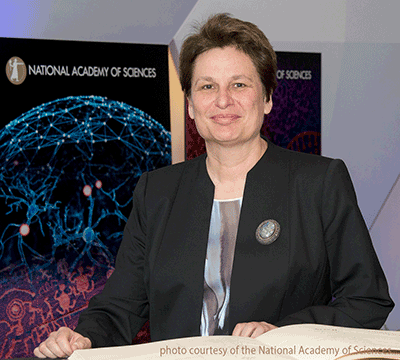Elected at last year’s annual meeting, Catherine Dulac was inducted into the National Academy of Sciences (NAS) at the Academy’s 153rd annual meeting this April. She is the Higgins Professor of Molecular and Cellular Biology and a Howard Hughes Medical Institute Investigator, and she served as Chair of the MCB department from 2007 to 2013. She is widely recognized for her innovative work exploring the molecular and neuronal basis of innate social behaviors in the mouse.
“Catherine Dulac has been a pioneer in the exciting new field of social neuroscience, which uses the tools of genetics, molecular biology and physiology to find out how the brain guides individuals’ interactions with each other,” explained MCB professor Joshua Sanes. “Her work on aggression, mating and parenting in mice is providing insights that will soon help us understand humans better.”
The NAS was established by an Act of Congress and signed into law by President Abraham Lincoln in 1863. “Scientists view election to the NAS as a great honor,” Professor Sanes said, “but the academy also serves the country. As a non-governmental body, it has both the expertise and the independence to provide all arms of government, and society as a whole, with guidance on the many scientific and technological issues we face.”
“I am extremely honored and humbled to join the National Academy of Science and its long list of inspiring, past and present, scientists,” Professor Dulac said. “This recognition would not have been possible without the hard work of the many terrific students and postdocs I had the great fortune of having in my lab, and I want to thank all present and former lab members for a really exciting scientific journey together.”
Professor Dulac’s group uses molecular, genetic and electrophysiological techniques to investigate the neuronal signals underlying pheromone signaling and how the brain processes those signals to generate species- and sex-specific behaviors. She also wants to understand the role of basic developmental processes, sensory experiences, genetics and epigenetics in establishing these behaviors. For that, she uses genome wide association studies and also investigates genomic imprinting in developing and adult mice. She believes this work ultimately has direct implications for understanding evolution and disease.
“My colleagues and I are extremely proud of Catherine’s research accomplishments and her originality and creativity,” said Professor Alexander Schier, chair of the MCB department. “Even more impressively, she is not only an exceptional scientist but also a highly engaged member of the MCB community”. Professor Dulac has served as director of the MCO graduate program since 2008.
Professor Dulac earned her Ph.D. in developmental biology from the University of Paris in 1991. She worked with Nicole Le Douarin at the Institut d’Embryologie du Collège de France on the developmental mechanisms of neural crest cell differentiation, and, as a postdoctoral fellow with Richard Axel at Columbia University, identified the first candidate genes encoding mammalian pheromone receptors. She joined the Harvard faculty in 1996. She is a Fellow of the American Academy of Arts and Sciences and the French Academy of Sciences.
National Academy of Sciences: http://www.nasonline.org/about-nas/mission/
Catherine Dulac: https://www.mcb.harvard.edu/mcb/faculty/profile/catherine-dulac/


